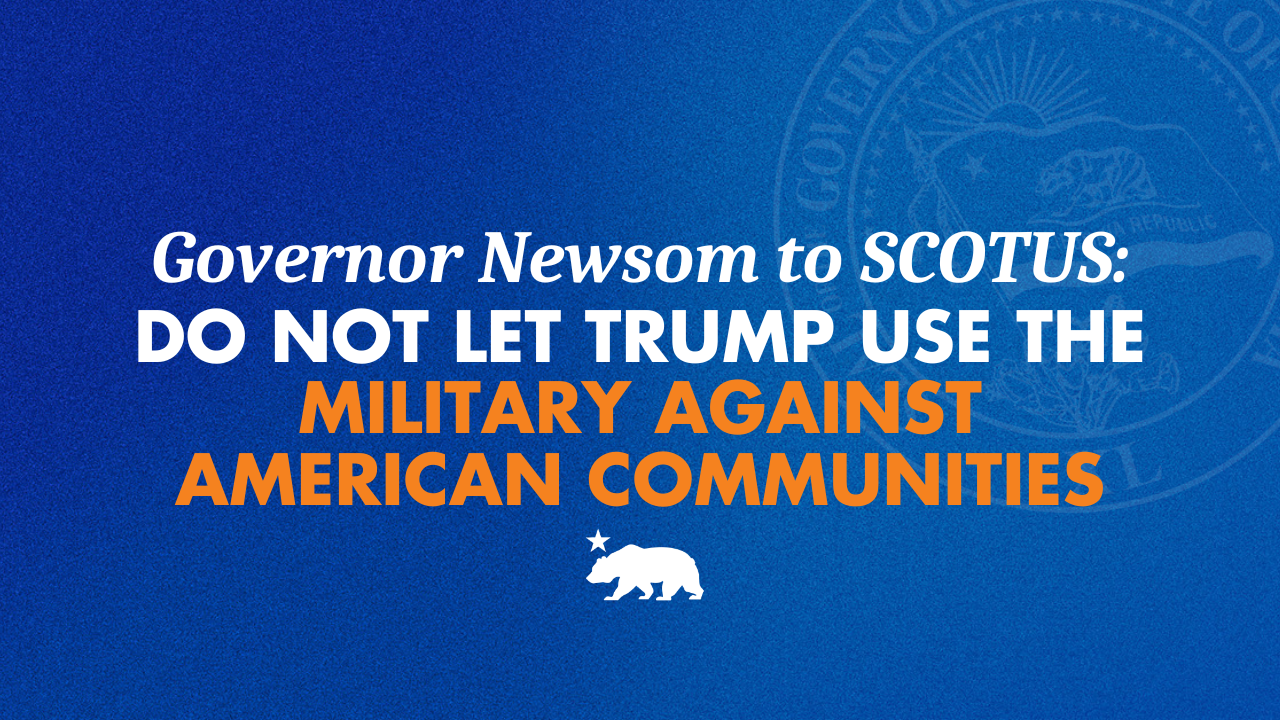“The Trump Administration is asking the Supreme Court to grant it unprecedented and unlimited power to deploy the military into American cities — power it has made clear that it fully intends to abuse,” said Attorney General Bonta. “Trump wants an army that serves a King, but in America, in our democracy, our military does not police the people. California has been ground zero for the Trump Administration’s militarization of American streets. In the four months since troops were first deployed to Los Angeles, we’ve seen the President abandon any attempt to justify their continued presence in our state, taking a near limitless view of executive power. I urge the Supreme Court to reject the President’s latest bid to defy our constitutional norms and grab power he does not have.”
Amicus brief
This amicus brief details California’s recent experience with the expanding federal mission for its National Guard members. Since the deployment of soldiers to Los Angeles in June, the federal government has shifted their reasoning and broadened their mission, dispatching hundreds of guardsmen beyond Los Angeles to Portland and Chicago.
Ultimately, their presence in other states means that there is truly no need for their federalization in Los Angeles as they are not even around to protect California from any supposed “lawlessness.” The federal government has now renewed these California guardsmembers federalization to at least February 2026.
The federal government asserts that federalized troops should have unrestricted authority to engage in law enforcement, without any judicial oversight of their actions—a stance that defies established norms. This position collectively sidelines the role of the courts, disregards congressional limitations, encroaches upon states’ sovereign interests, and would lead to an alarming expansion of federal power.
Read the amicus brief here.
Trump’s federalization of Los Angeles
On June 7, for the first time in our country’s history, the President invoked 10 U.S.C. § 12406 to federalize a state’s National Guard over the objections of the state’s governor.
President Trump and Department of Defense Secretary Hegseth transferred 4,000 members of California’s National Guard—one in three of the Guard’s total active members—to federal control to serve in a civilian law enforcement role on the streets of Los Angeles and other communities in Southern California.
California brought suit to challenge that unprecedented action. The litigation is ongoing – and the Ninth Circuit will hear arguments on Wednesday in an appeal from the trial judge’s order blocking the federalization and deployment of the Guard.
Update on cross-country legal actions
Illinois: In October 2025, a federal district court issued a temporary restraining order to block the deployment of federalized troops, including the Texas National Guard, to Chicago. This action followed a lawsuit filed by state and city leaders against the Trump administration to prevent such a deployment. While a federal appeals court later permitted the troops to remain federalized and mustered, it upheld the prohibition against their deployment within Illinois. The Trump administration has since appealed this decision to the Supreme Court. Four judges, including two appointed by Republicans, have already ruled against President Trump and found that no facts supported his deployment of the National Guard to Chicago.
California: Following a bench trial, a federal judge ruled in August 2025 that President Trump’s deployment of the California National Guard in Los Angeles violated the Posse Comitatus Act. This law restricts the military’s involvement in domestic law enforcement and was central to a lawsuit filed by Governor Gavin Newsom and the state of California against the Trump administration regarding the federalization and deployment of these troops. That ruling is on hold pending the federal government’s appeal.
Oregon: A federal lawsuit was filed by Oregon and Portland, and later joined by California, to block the deployment of National Guard troops to Portland. A district court judge initially blocked the federalization and deployment in early October 2025, but the U.S. Court of Appeals for the 9th Circuit later “stayed” that restraining order to the extent it would de-federalize the Guard troops. The order blocking deployment of Guard troops in Oregon remains in effect for now. Litigation is ongoing in that case.
We don’t need the federalized National Guard in SF
Local officials do not want the National Guard in San Francisco, contrary to what President Trump actually believes.
California’s partnership with local communities, especially in San Francisco, has helped reduce crime and increase public safety by seizing illicit drugs and firearms off the streets.
According to the Major Cities Chiefs Association, overall violent crime in major California cities is down 12.5% in 2025 compared to 2024. The largest overall declines in violent crime were reported by the police departments in Oakland (30%) and San Francisco (22%). Plus, another data set released by the California Department of Justice, nearly every major crime category, including violent crime and homicides, dropped in 2024.
The results in California’s major Bay Area cities cross over into overall success for the state as California’s 2024 homicide rate is now the second lowest it has been since at least 1966.
And when comparing crime rates in San Francisco before the COVID-induced crime surge, between 2019 and 2025, there has been a 45% decrease in homicides and 40% decrease in robberies.
Specifically looking at homicide rates during the same time period, several major cities have actually seen increases in homicides since 2019.
San Francisco
⬇️45%
Austin
⬆️115.4%
Fort Worth
⬆️30.3%
Kansas City (MO)
⬆️25.4%
Oklahoma City
⬆️45.5%

